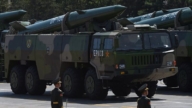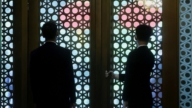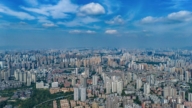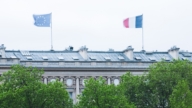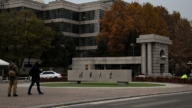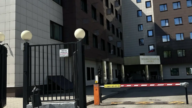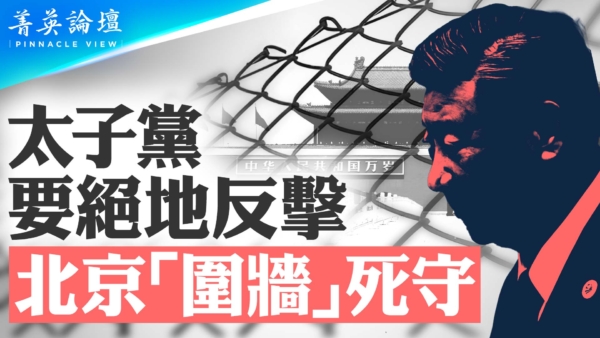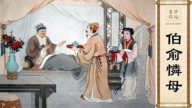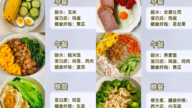【新唐人2014年03月05日訊】中共喉舌《環球日報》3號發表社評抱怨:為何提敏感問題是境外記者的「特權」。《環時》還把這種「不公」,提到有損中共媒體公信力、和國家軟實力的高度。這篇罕見的另類社評,引來中國網友的討論。
《環球日報》抱怨境外記者「特權」一說,源於香港《南華早報》在政協會議新聞發佈會上,提問有關前中共政法委書記「周永康事件」,並得到政協發言人呂新華近乎肯定的回覆:「你懂的」。
3月3號《環球日報》發表社評抱怨:提敏感問題為何是境外記者的「特權」。
社評說,「兩會」讓中國公眾看到了國內記者在境外同行面前的「弱勢」,展示了境外特別是西方記者的「強勢」和「客觀」。因此對普通中國公眾來說,後者(西方記者)「更像記者」。
社評認為,這是「中共軟實力的一個困局」,當局針對敏感問題的現行做法,在維護一件件具體事情順利的同時,卻傷及了國家主流媒體的公信力。
《環球時報》罕見的另類社評,在網上引發議論,有網友譏諷:「為何境外記者有『特權』你懂的」
有網友回應:「因為境外記者沒有練過叼飛盤。」所謂「叼飛盤」,是指人和狗玩的一種遊戲,主人扔出的飛盤,狗總能第一時間給叼回來。
《環球時報》的報導因為長期配合中共的指令,因此一直被中國民間譏笑為「叼飛盤」,《環時》還因發表《媒體應是國家利益的「看門狗」》一文,被網民戲稱是「黨的看門狗」。
時政評論員汪北稷指出,《環球時報》長期被網友冷嘲熱諷,甚至被稱為「沒有思想的牆頭草」,如今為了周永康這種搶風頭的新聞,竟然要重拾節操了。
時政評論員汪北稷:「實際上像類似於環球時報、包括人民日報,中共官方的,特別是共產黨直屬的這些媒體,不能稱為真正的傳媒,只稱之喉舌,所以它們最最缺乏的就是:傳媒的精神去探索,獨立調查,發表自己的聲音。」
汪北稷分析,《環球時報》作為中共的發聲筒,它以為在中共得天獨厚支持下,能在新聞界獨佔輿論鰲頭,但在一些新聞報導上,被主子扼住咽喉,也只能發發牢騷。
汪北稷:「中共對媒體控制,不光是中國大陸的,還有香港的,還有西方媒體在北京的,它都是採取控制和恐嚇的手法,如果說西方媒體在它的所謂兩會上,問出了一些很尖銳的問題,它就會取消他的簽證,限制它的活動空間,封鎖他的網站。」
去年美國《紐約時報》和《彭博社》,因不斷報導中共領導人家族斂財,曾一度被中共當局封鎖。去年底,兩家網站的24名駐北京記者,更被中共拒簽入境。
3月2號,中共「兩會」召開前夕,《人民日報》發表評論,呼籲兩會代表們不要沉默,要負起責任。作為政協委員的《央視》名嘴崔永元回應說:我們敢發言,你敢發佈嗎?
原《河北人民廣播電臺》編輯朱欣欣指出,由於中共沒有明文規定哪些是所謂的敏感話題,人們在公共場合的言論,或者讓官員難堪的話題,都可能被當作敏感話題遭打壓。
原《河北人民廣播電臺》編輯朱欣欣:「你光說讓大家講真話,可是講真話之後,受到打擊報復,穿小鞋這就不行,你得讓大家有一個講真話的環境,首先是你們當領導的,當局的應當有這麼一個鼓勵的機制和保障的機制。」
汪北稷指出,中共一方面叫政協、人大多提尖銳的問題,一方面又把一些敢發聲的人關進牢裡。
汪北稷:「所以《人民日報》號召它的政協、人大的這些代表去講真話,完全是虛偽的號召,而這些人大、政協的人士即是既得利益者,清清楚楚看到中共執政60多年來『因言獲罪』殘酷的現實,絕對不敢講真話。」
汪北稷指出,政協、人大只是「橡皮圖章」,他們只能在中共劃定的範圍之內,去提一些環境、霧霾等皮毛問題。像政治權力,公民利益,國家體制等,他們絕對不能提也不敢提。
採訪編輯/李韻 後製/陳建銘
State Media Humiliated in Front of Overseas Journalists
The Communist mouthpiece Global Times editorial complained
on March 3, that overseas reporters have the privilege to ask
sensitive questions.
It also reported that this unfairness damages the credibility of
Chinese media and the state’s soft power.
This rare event and odd style of commentary by the Global
Times is being discussed by the Chinese netizens.
The “privilege" complained of by the Global Times originated
from the question posed by Hong Kong’s South China Morning
Post at the press conference prior to the National People’s Congress,
It regards the Zhou Yongkang case, and the subsequent response by
the spokesman Lu Xinhua, “You understand."
On March 3, Global Times editorial complained that overseas
reporters share the privilege of being able to ask sensitive
questions.
The editorial stated, that the parliamentary meetings demonstrate
the vulnerability of domestic Chinese reporters in front of overseas
reporters, whose strength is objectiveness.
To the general Chinese, overseas reporters, especially the
Western reporters behave more like “reporters.”
The editorial commented the dilemma ofthe CCP’s soft power,
while the authorities proceed, the sensitive issues are monitored
and the domestic mainstream media’s credibility has been damaged.
This rarely seen and odd editorial from Global Times caused
netizens’ discussion.
A netizen ridiculed: “Why do overseas reporters have ‘privilege’?
You understand."
Another netizen responded: “Because overseas reporters have
never practiced ‘go fetch.’”
Global Times have long been known to take orders from the CCP
in reports and is ridiculed by the public as ‘go fetch.’
Global Times has also been nicknamed as the ‘Party Watchdog’
for its previous editorial entitled, “Media should be the ‘watchdog’
of state interests.”
Commentator Wang Beiji indicates that the Global Times has long
been criticized by Chinese netizens as the “the mindless bending
weed,” trying to claim its ethics over news on the Zhou Yongkang
case.
Commentator Wang Beiji: “In fact, none of the state run media
such as the Global Times, the People’s Daily, the ones directly
under the Communist Party are worthy of the title.
They are simply the Party mouthpiece.
They lack the spirit of genuine media to conduct or explore any
independent investigation, or expression of their opinions."
Wang Beiji analyzes that the Global Times had wanted to
monopolize opinion with the blessing and support of the CCP,
but was only strangled by the CCP.
Its reports can only lead to some complaints.
Wang Beiji: “The CCP controlls with the tactics of threat to
media domestically, in Hong Kong, as well as the West.
Any tough questions during parliamentary meetings will cause
the foreign journalist’s visa being revoked. They are also subject
to restricted and limited activities and Internet access."
Last year, reports on the money grabbing CCP officials’ families
had both the New York Times and Bloomberg blocked.
Late last year, 24 reporters of these media in Beijing were refused
a visa.
On March 2, prior to the CCP’s Parliamentary meetings, People’s
Daily editorial called on the Congress to speak up and take
responsibility.
CCTV talk show host, Cui Yongyuan, also a member of the
Political Consultative Conference, responded: We dare to speak,
but do you dare to publish?
Former editor of Hebei People’s Radio Zhu Xinxin says that:
without a clear definition of the so-called sensitive issues, any talk
in the public or challenge to the officials could be regarded as
sensitive and suppressed by the CCP.
Zhu Xinxin, former editor of Hebei People’s Radio: “You can’t
just ask people to tell things and then punish them for telling.
The environment to tell things, the authorities, especially the
leaders, need to provide mechanisms to encourage and safeguard
the environment for telling things."
Wang Beiji comments that the CCP told the Congress to raise
tough issues, but also put those who dared to talk in jail.
Wang Beiji: “People’s Daily call for Congress to speak-up
is simply hypocritical.
Those Congresses are the vested interests, they have learnt it well.
For more than 60 years of the CCP ruling, the cruel consequences
of daring to talk have taught them not to talk."
Wang Beiji says that the Political Consultative Conference and
the National People’s Conference are just two rubber stamps.
They are only allowed to speak on some superficial questions
such as the environment, the smog.
Anything such as political rights, citizen’s benefits, or
the state system, is not and can’t questioned.



